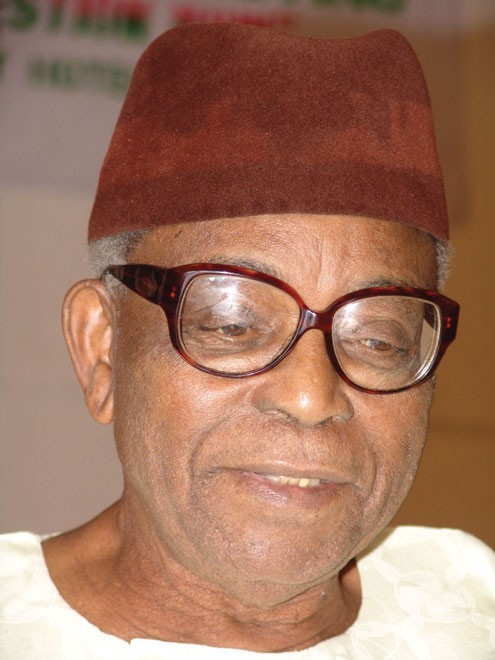Things to know about Enahoro, Ambrose Alli, Effiong pardoned by Buhari

President Muhammadu Buhari on Thursday granted presidential pardon to the following five Nigerians, two of them posthumously.
The five are: The Late Prof Ambrose Alli, The Late Chief Anthony Enahoro, Ex Lt. Col. Moses Effiong, Major E.J. Olanrewaju and Ajayi Olusola Babalola.
Minister of Interior Rauf Aregbesola who announced the pardon said scantily of Ali and Enahoro:
Aregbesola did not provide any information at all on Effiong, Olanrewaju and Babalola.

P.M.News has now pieced together salient things that you need to know about some of the beneficiaries of the pardon:
Moses Effiong
He was condemned along with Gen. Mamman Jiya Vatsa, Lieutenant colonels Chris Oche and Mike Iyorshe. His death sentence was however commutted to life imprisonment.
Iyorshe and Bamidele paid the supreme price.
Thirteen members of Nigeria’s military forces were altogether sentenced to death at the time.
Others sentenced with Effiong were Squadron Leaders Martin Luther and Asen Ahura; Majors Daniel Bamidele, Akwashiki, V.E. West, and Jonathan India Garba; Navy Commander Andrew Ogwuji; and Wing Commanders Ben Ekele and Adamu Sakaba.
Wing Commander Joseph Uku and Lt. Peter Odoba were sentenced to life imprisonment for not making adequate effort to notify the authorities of the coup plot.
Brig. Malami Nasarawa, former commandant of the Nigerian school of infantry, was ordered dismissed from the army for concealing the plans to overthrow the government.
Those acquitted for lack of evidence included Lt. K.G. Dapka, Squadron Leader Gabriel Ude, and Majors Anthony Sese and Chukwuka Onyeke.
Ambrose Alli:
The Professor of morbid anatomy was the first civilian governor of the Old Bendel state, now broken into Edo and Delta. He governed the state between 1979 and 1983, when he was defeated in the polls by Chief Samuel Ogbemudia. He died in 1989 when he was just 60 years old.
The money was meant for a road project.
Ali was born in Idoani, Ondo State on 22 September 1929.
After childhood education in between Bendel and Ondo, Ali went to the School of Agriculture Ibadan (1948) and the School of Medical Technology, Adeoyo Hospital Ibadan (1953–1960).
In the latter he gained an MBBS and went further to the United Kingdom for a post-graduate course in neuropathology at the University of London (1961–1966).
He got a a D.C. Pathology degree.
Later he studied at the University of Birmingham from 1971 to 1974.
He was a lecturer at the University of Ibadan (1966–1969) and was senior lecturer at the Ahmadu Bello University, Zaria (1969–1974).
From 1974 to 1979, Alli was Professor of Morbid Anatomy and head of the department of pathology at the University of Benin, Benin City.
He was elected governor in 1979 as a member of the Unity Party of Nigeria.
As governor, Ali expanded educational facilities and gave out the highest bursary of N600( about $1,000) for students in UPN states. He built and equipped hospitals and made access free. He built houses and roads.
He was the founder of Bendel State University in Ekpoma, which was renamed in his honour as Ambrose Alli University after his death.
Anthony Enahoro:
Nationalist, newspaper editor, golfer, erudite politician: Anthony Enahoro was a great talent of his generation.
He was born in Uromi, Edo state on 22 July 1923 and lived till he was 87. He died on 15 December 2010.
He was educated at the Government School Uromi, Government School Owo and King’s College, Lagos.
He became the editor of Nnamdi Azikiwe’s newspaper, the Southern Nigerian Defender, Ibadan, in 1944 at the age of 21, thus becoming Nigeria’s youngest editor ever.
He later became the editor of Zik’s Comet, Kano, 1945–49, associate editor of West African Pilot, Lagos, and editor-in-chief of Morning Star from 1950 to 1953.
One of Enahoro political heroics was moving a motion for self-government in 1953. The motion was defeated and Nigeria did not become independent until 1960.
Enahoro began his political career in 1950, when he, along with Arthur Prest founded the Mid-West Party.
But he later joined the Action Group, founded by Obafemi Awolowo.
When crisis broke out in 1962 in the Western region, Enahoro was immersed fully in it. He was detained along with other Action Group leaders, accused of treason.
Enahoro chose to flee to Britain, via Ghana.
He became the ‘fugitive offender’.
He was however extradited to Nigeria and jailed along with Awolowo and others.
It was not clear whether he was pardoned for the treasonable felony case or a latter case of treason during the Abacha era.
Enahoro, Wole Soyinka, General Alani Akinrinade and eight others were charged with treason in 1997. But the case was dropped by General Abdulsalami Abubakar, who succeeded Abacha.
Enahoro was the leader of the then Mid-West delegation to the Ad Hoc Constitutional Conference in Lagos during the 1966 crisis that presaged the civil war.
He later became Federal Commissioner (Minister) for Information and Labour under the General Yakubu Gowon Military Government, 1967–74; Federal Commissioner for Special Duties, 1975. During the time, he also became the president, World Festival of Negro Arts and Culture, 1972–75. The festival was held in 1977.
When party politics returned, Enahoro opted to join the National Party of Nigeria, instead of the Unity Party founded by Awo.
He was in the NPN from 1979-1983 NPN.
Enahoro was later to abandon conservative politics and support Moshood Abiola in the struggle to retrieve his mandate in the June 12 1993 election.
He became the chairman of the National Democratic Coalition (NADECO), a pro-democracy group that fought dictator Sani Abacha till Abacha’s death.
When party politics returned Enahoro insisted on restructuring Nigeria and formed the Movement for National Reformation, MNR; as well as the Pro-National Conference Organisation, PRONACO.
He was awarded honorary DSC by the University of Benin in 1972. He was also conferred with the national honour of Commander, Order of the Federal Republic, CFR, in 1982. (PM News)

